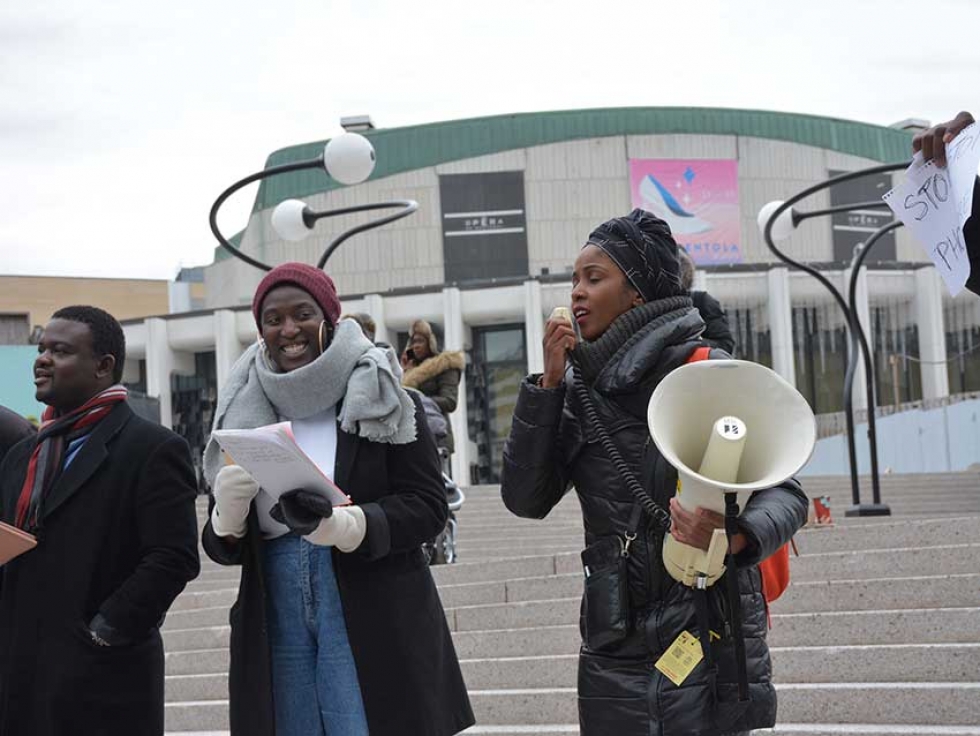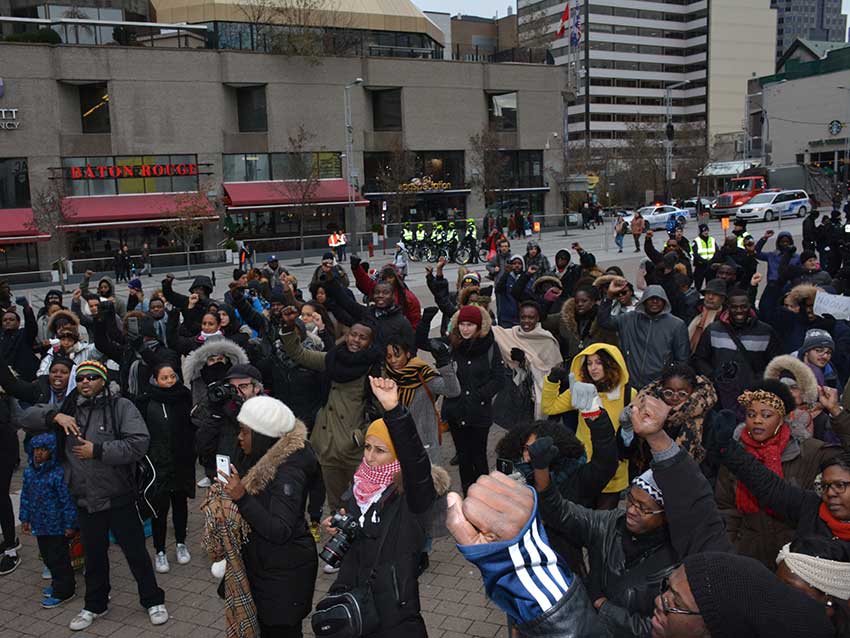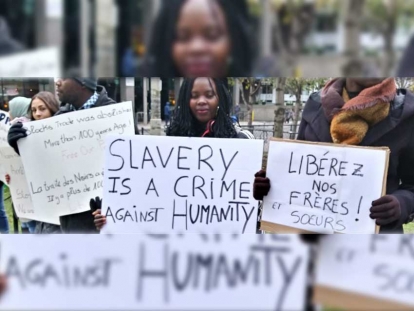 Somali Canadian Yasmine Mo speaks at a demonstration against the enslavement of African migrants in Libya on November 18 in Montreal.
André Querry
Somali Canadian Yasmine Mo speaks at a demonstration against the enslavement of African migrants in Libya on November 18 in Montreal.
André Querry
Dec
Reflections of a Black African Muslim Woman Living in Quebec on the Exploitation of African Migrants in Libya
Written by Beyond Libya SeriesSomali Canadian Yasmine Mo is pursuing a Master’s in sociology at the Université de Montréal. Her thesis explores the social realities of Black Muslim women living in Montreal, the contributions of these women to Quebec society. The intersection of anti-Black racism, sexism and Islamophobia are at the centre of her studies.
Yasmine Mo spoke at a demonstration organized on November 18th by African Canadians in Montreal in the wake of recent reports that have hit mainstream media about the abuse, exploitaiton and in some cases enslavement experienced by African migrants in Libya, as situation that Amnesty International has described as "horrific".
Muslim Link interviewed Yasmine Mo about participating in the demonstration, the African migrant crisis, navigating life as a Black African Muslim woman in Quebec who is active in the fight against anti-Black racism, Islamophobia, and gender inequality, and why she hopes more Muslim Canadians will speak out about what is happening to African migrants in Libya.
When did you first learn about the abuses happening to migrants in Libya?
As a Somali born in Djibouti, I still have family living all over the horn of Africa. It has always been obvious to me that anti-Black racism has for a long time been a serious issue, especially in Africa. Considering our history linked to French colonization and the fact that I personally took the time to study the history of Arab enslavement of Africans, which no one seems to really want to talk about, I’ve known for a long time that many Africans were victims of heavy racism on the African continent and that strictly because of the color of their skin. This reality is not big news for most Africans in the diasporas and those living in African countries. The real important question is: What are we African people actually doing about this horrific reality, concretely?
How did you learn about the demonstration against slavery in Libya organized by Africans in Montreal? How were you involved?
I try to stay involved as much as I can here in Montreal. I believe being in contact with people, especially the youth, is the only way to really understand what’s actually going on politically. So, when I heard that a young African woman was pushing to organize a demonstration in Montreal to talk about the ongoing injustices that young Black Africans are facing in Libya, of course I wanted to be present at the demonstration. Quickly, through Facebook, it was clear she was struggling to find women who could actively take part in the demonstration. That's why she invited African women to speak up during the event. I saw her Facebook post saying she needed women to speak up, so I messaged her privately right away. The day of the demonstration, a few minutes before it was about to start, we spoke briefly and she agreed to add me on the list of speakers. Unsurprisingly, even if she instigated the initiative, mostly men ended up taking the lead during the demonstration.

What were the demands being made by the demonstrators?
I think that’s where African people living in Quebec need to really learn from their mistakes and do better. To me, there were no clear demands in favor of real solutions for Black Africans being presented. It also seemed like, at some point, the demonstration was overtaken by a few racialized politicians looking for visibility. Without really understanding and addressing the depth of the social and political issues affecting thousands of young African migrants risking their lives every year, many of them grabbed the microphone to show support without adding to the analysis. Many of the Black Africans who spoke during the demonstration were seeking for support from the Canadian government in order to fix a problem only African people thoroughly understand and can change.
Migrants from the Horn of Africa, Central Africa and West Africa have been crossing through Libya in the hopes of making it to Europe. Long before the stories of Syrian children dying crossing the Mediterranean, African children were dying crossing the Mediterranean but there was very little attention paid to this in Western or Muslim media. Why do you think that is?
Indeed. This is nothing new, like I said. Anti-Black racism has everything to do with the fact that Black people can be used simply as a means to an end. That said, Black pain can be talked about without addressing it or doing anything about ceasing the pain itself. That’s what the sometimes lethal violence of racism has always been about. As for the Muslim media, it seems we have not yet succeeded in discussing the important and specific sociological roles of religion, culture and spirituality to push against the instrumentalisation of religions. Black Africans who happen to be Muslims are the main people to pay in every way possible for the lack of conversations and actions around these issues.
Why do you think Western media is talking about violence and exploitation of African migrants in Libya now when it has been a crisis for years since the fall of Qaddafi's regime?
Again, most people who know about the story of slavery in Africa and the consequences on its societies, also know that if Western media really wanted to cover these horrific realities, they would cover them yearly, closely and through strong long lasting collaborations with Black African media who are already on location. Especially when it comes to the subject of Black bodies being violated and sold, the issues need and have to be discussed mainly by Africans who are experiencing the impacts of these tragedies. Also, as a person following the content the media puts out in Quebec, it seems like the Western media doesn’t find relevant to address the roles of international organizations (France, Canada, USA, China, etc.) in these stories of violence. All these organizations are very important witnesses but then again are still not speaking loud enough about what they should all be reporting and fiercely acting against. How is it that covering meticulously what is described as the downfall of the Libyan society should be our priority when addressing the death of innocent Black people in Africa who have been violently dying before, during and after Qaddafi? Once again, young Black African people are not being centered in these analyses and, again, are being used as a means for an end that’s not benefiting them, for the most part.
Why is it important that any Canadian activism done on the issue of exploitation and slavery in Libya centre the voices Africans living in Canada?
Especially in Quebec, I think that way too many people tend to forget that being a Black African immigrant or the child of a Black immigrant often means that your heart and/or your family are still evolving on the African continent. Everywhere around the world, in solidarity with all Black experiences, people fighting for Black lives mobilized in some shape or form to educate the masses and/or stand against the anti-Black racism affecting young Black Africans.
In Quebec, it seems like African Black lives didn’t matter to enough people, including important Black activists fighting anti-Black racism everyday in the province, many weren’t present at the demonstration. Which to me shows the deep limitations of the vision of activism in Quebec when it comes to fighting against anti-Black racism globally. When it comes to the subject of Africans living in Africa being violated, well, their pain and struggle has become normalized by too many people. We need to keep working in order to support the fight for and with Africans living on the continent. As Black folks, their lives matter too.
Do you think it is important for Canadian activists to understand the wider context of this situation and go beyond Libya to discuss the human rights situation of African migrants globally including Canada?
Of course. The reality of slavery in Africa forces all Black activists to widen their perspectives in order to move in alignment with common goals. I believe that the fight against racism and the corruption existing everywhere can only be tackled if we have a global view of the consequences of our actions. For example, since Africa is a major provider of essential resources for many Western countries, much of what we consume here in Canada has a huge impact on African Black lives. So we can’t act like people living in Africa are too far for us to care about. As people living in Canada, doing so automatically makes us partly complicit in the chaos we are loudly denouncing.
Why is it important for Muslim Canadians to get involved in this cause?
Personally, I’ve been involved in different organizations here in Montreal. I have to say, as a Black African Muslim woman that wants to address more than just one form of discrimination at once, I came across too many Black activists and intellectuals not able to view my experiences as real and valid. The ramping up of Islamophobia in Quebec can also be felt in the Black communities, unfortunately. It seems that way too many people in Quebec don’t understand or are not even trying to understand the Black|Muslim identities. Black Muslim youth, I believe, are one of the most at risk groups when discussing underrepresented groups. For that reason alone, if they can, Muslim Canadians must be actively engaged. It’s crucial.
Do you think it is important for Muslim Canadians to engage in dialogue with non-Muslim Africans in Canada in order to show solidarity and honestly discuss the impact of anti-Black racism in Muslim societies on African migrants?
Absolutely. Real allies are important for Black Muslims living in Canada. In Montreal, we mostly find Caribbean Black peoples make up the majority of Black community members. I actually had the pleasure to grow up with a diversity of English speaking Black folks in the Little Burgundy neibourhood of Montreal. The majority of them are not Muslims and many are not necessarily familiar with what it means to be Black, Muslim, diasporic, etc.. As Black people, sharing our experiences means we will broaden the way we each understand the realities affecting all Black people in Canada and across the world. Especially for Black people, it’s critical to engage with people we perceive as different than us. The fight against anti-Black racism depends on that openness.
As a Black African Muslim in Canada what do you see your role as in this struggle?
If and when we can, we have to speak up and strategizes around the actions we must take to make things better for the younger people watching us. When I think about my childhood in Montreal, I don’t have anyone in mind that was a Black Muslim woman inspiring me to be a better citizen or an outstanding professional. Aside from my mother, I had no one I could actually look up to and say: "If she can, I can too".
Fortunately for me, my single mom was enough inspiration to get me where I am now. The power of representation can really move mountains and we owe it to our youth to continue working to make things better. Staying aware by educating ourselves daily and making sure we stay available to them while being grounded is what I aim for everyday.
This article was produced exclusively for Muslim Link and should not be copied without prior permission from the site. For permission, please write to info@muslimlink.ca.













